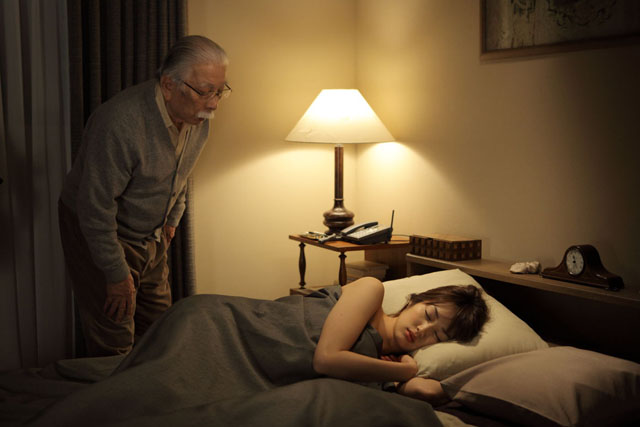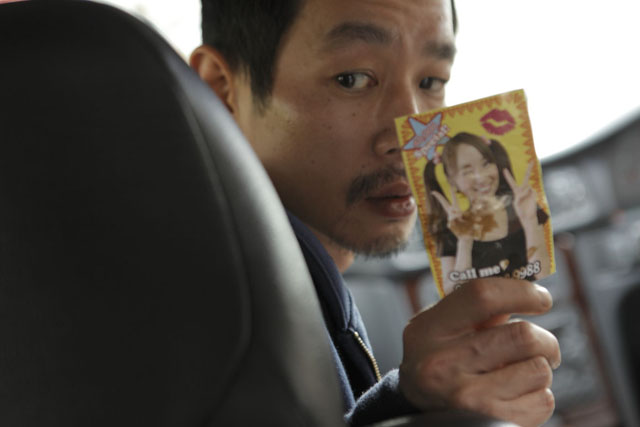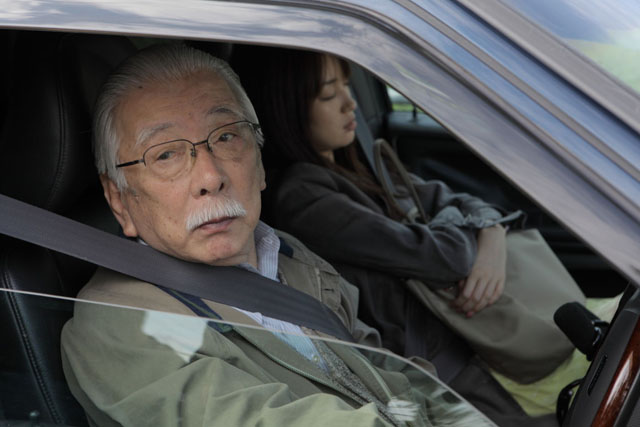“And then we have Abbas Kiarostami‘s Like Someone in Love, regarding which I have to just punt, I’m afraid.” That’s an admirably brave admission to make anywhere, but especially in a spotlight as bright and public as the AV Club‘s. Seriously. There’s no way to measure how much bluffing there might be going on in current critical discourse, but Mike D’Angelo’s honesty could only be as refreshing as it is if there weren’t some. At any rate, Mike D’Angelo: “That Iran’s greatest director shot this film in Tokyo with an entirely Japanese cast isn’t the issue—it’s unmistakably his work, especially considering that roughly half of it takes place in a moving or parked car. And I can break the story down for you, no problem: a college student [Akiko, played by Rin Takanashi] who moonlights as an escort (without her boyfriend’s knowledge) spends what appears to be a platonic night with an elderly professor [Takashi, played by Tadashi Okuno], who drives her to an exam the next day, discusses the pros and cons of marriage with her boyfriend [Denden] (who mistakenly assumes he’s her grandfather), and attempts to rescue her when the boyfriend discovers what’s actually going on. What I don’t remotely understand is what the movie purports to be about, or why Kiarostami wanted to make it.” And he elaborates.
Karina Longworth, also up front about what she’s gleaned and what she hasn’t from a first viewing, in a dispatch to the LA Weekly: “As much as it takes mistaken and appropriated identity as a subject (not unlike Kiarostami’s last film, Certified Copy), Love‘s own enigmatic, constantly shifting generic identity is at least as compelling as any of its actual content (and I was pretty enraptured throughout, though sometimes mostly by aesthetics—the look is gloriously polished). The movie, which gets its title from a song sung by Ella Fitzgerald which plays during Takeshi and Akiko’s date, is infused with a jazzy melancholy… But it’s also a kind of screwball comedy, and kind of a noir—both genres rich with playacting. I’m not going to pretend I fully ‘get’ exactly what Kiarostami is up to here—if anything I’ve seen here deserves more brain space than I have available to give it during in the middle of the festival marathon, it’s this—but I was pleasantly disoriented throughout, and I thought the film’s final moment was thrilling.”
“An unofficial twin to Copy, sharing its playful preoccupation with identities mistaken and assumed, it’s a more austere and less intellectual work,” writes Guy Lodge in Variety. “Kiarostami’s second film set and shot outside his native Iran continues his exploration of other global territories as a direct means of expressing certain cinephilic affections. Just as the Tuscany-set Certified Copy casually traced around multiple aspects of Roberto Rossellini’s Voyage to Italy, the spartan Tokyo story of Like Someone in Love is laced with references to the filmography of Yasujiro Ozu, from obvious narrative cues like a young woman’s affectless neglect of her visiting grandmother to subtler variations on the Japanese master’s framing. Quite what the homage is supporting is harder to gauge, as Kiarostami’s breezy, sometimes cruel tale of mistaken identity reads as a near-parody of Ozu’s still-waters humanism.”
From Craig Keller‘s notes: “In Certified Copy, reality mutates; the same can be said of Like Someone in Love, but it no longer means the same thing. In Certified Copy, reality inside of metaphor; in Like Someone in Love, metaphor from the reality.”
“The image of the mirror is present throughout the film,” notes Domenico La Porta at Cineuropa, “mostly in a series of shots and reverse-shots used to film the two sides of many conversations. The director tirelessly repeats this stylistic device by varying the settings: dialogues shot from either side of a restaurant table, from a street then from the inside of a house through a window, from the inside of a car then from the pavement, from the back seat then from the front seat…”
“The movie is cut off so sharply, I almost wondered if, like Tarantino’s Kill Bill, there is some second part still to come,” writes the Guardian‘s Peter Bradshaw. “The enigma of its sudden stop doesn’t seem, on the face of it, to be a particularly rewarding one. It is just opaque…. It is a beautifully shot, and very nicely acted beginning to something: but finally frustrating.”
Writing for Time Out London, Geoff Andrew grants that the ending “will leave some mystified, even frustrated by an openness that makes the mysterious final moments of Certified Copy feel like proper closure. But the film is consistently engrossing… Just a few ideas as to some of the themes Kiarostami touches on: the relationship between truth and falsehood; how and why people form relationships; what would happen if they made different choices; the pros and cons of youth versus age; the difference between observing and participating; and—in what might be occasional allusions to Ozu, a director Kiarostami admires—the value and dangers of accepting whatever life has to offer.”
“Like many of Kiarostami’s films, Like Someone in Love is at least in part about the way people tell stories and stories tell people, but the way the theme is developed here seems less emotionally and ethically resonant than in, say, Ten or The Wind Will Carry Us,” writes Lee Marshall in Screen. IndieWIRE‘s Eric Kohn adds that the new film “suffers from a lack of feeling to service its analytical purpose.”
“Technically speaking,” writes Jordan Mintzer in the Hollywood Reporter, “Like Someone in Love is exquisitely made—from the shadowy, nuanced cinematography of Takeshi Kitano regular Katsumi Yanagijima to the rich sound design of Reza Narimazadeh (A Separation). While there are several aesthetically imposing scenes, perhaps the most memorable is a trance-like sequence of Akiko crossing Tokyo in a taxicab at night—an impressive dance of movement, light and layered voices that certainly gives Sofia Coppola a run for her money. Editing by the director’s son, Bahman Kiarostami, allows the performances to play out in uninterrupted takes, and the three principals—especially Okuno, who provides a deliciously deadpan mix of reverie and wisdom—acquit themselves extremely well.”
Updates, 5/22: Bit of breaking news today from Variety‘s Nick Vivarelli, who has confirmation from producer Marin Karmitz that Kiarostami does indeed plan to shoot his next film in Apulia, the southeastern region of Italy—the heel of the boot, in other words. Kiarostami first mentioned his working title, Horizontal Process, at the Bari Film Festival in March that what he likes about Apulia is “the complex architecture of the various cities, which conveys the complexity of the people who live there.” Vivarelli: “Kiarostami added that he ‘hoped to bring the same complexity to the film,’ which is now in early development. ‘He is supposed to bring me the script; I think he may have it with him right now,’ Karmitz confirmed. However, Karmitz cautioned that ‘with Abbas, until the cameras start rolling, you never know. He is absolutely capable of changing his mind.'”
Time Out Chicago‘s Ben Kenigsberg recalls that, in Certified Copy, “a café proprietress makes an assumption about Juliette Binoche and William Shimell’s characters, and the mistake colors every subsequent scene. That sort of gaffe occurs again and again in Like Someone in Love. An old man is taken for a grandfather, his neighbor perceives a young woman as his granddaughter, and an escort is treated as something like a genuine paramour. (‘Not a day goes by without me being told that I look like someone,’ Akiko quips at one point.) Other confusions abound: Akiko’s boyfriend (Ryo Kase) is asked to trust her false description of her whereabouts; Takashi jumps to conclusions about Akiko’s favorite foods; Darwin’s work is mixed up with Durkheim’s…. To an even greater degree than Copy, this movie about misinterpretation insists on keeping its audience guessing, maintaining an ambiguity about its intentions that lingers well after the final shot. As in the previous film, there’s an element of homage; the generational contrast seems a pointed nod to Japanese masters like Ozu and Naruse. But Like Someone in Love has no analogue. Kiarostami’s sensibility is certifiably his own.”
“Ending menacingly, Like Someone in Love has the distinction of being the most unpredictable title to screen in competition so far,” writes Melissa Anderson for Artforum. ‘I had no idea what was going to happen from scene to scene,’ a somewhat exasperated New York–based colleague said in the Debussy foyer afterward. His comment should be interpreted as high praise: Unlike the bickering couple in Certified Copy—for which an exhaustingly histrionic Juliette Binoche was awarded Best Actress at Cannes—the mysterious central trio in Like Someone in Love never wear out their welcome.”
Updates, 5/23: For MUBI’s Daniel Kasman, Like Someone in Love “has become the first film here and indeed for quite some time that, as I watched it proceed, I never knew moment to moment where it would go. It is a rare experience indeed to have cinema blindside you, hold you in vague anticipation, be ambushed and mis (or re-) directed.” And “how the film gets from place to place, the strangeness, silences and unanswered questions between old man and young girl—especially notable in the face of the boyfriend’s verbose rants—express a profound gap in the film, a large, miasmic emptiness where a normal movie would be found filling in the inner psychology and exterior motivations of the two, as well as expanding the world around them. Instead, like the many driving scenes in the film, everyone seems to be circulating in a bubble or cocoon, cut off from the world, a sense of extracted artifice very much like that of Certified Copy.”
“Throughout the running time, and despite the not-exactly-elliptical narrative drive, something feels totally awry,” agrees Blake Williams at Ioncinema. “Similar to Copy‘s vivacious trickery, characters’ motivations and a sense of who knows what maintain a conspicuous, impenetrable distance. A through-line hazily emerges halfway into the film when we learn that Akiko, who’s just taken a college exam in the very subject that Takashi specializes, botched a question asking about evolution and Darwin. ‘Survival of the fittest’ obviously being a key element to that theory, it becomes evident that the subject of the film is this protection—physical and emotional—that we rely on from loved ones. It’s a guard that we instinctively seek to both provide and have provided to us by others, and this is the essential absence in Takashi and Akiko’s lives at the moment they meet.”
David Jenkins in Little White Lies: “Like Someone in Love is very much of a piece with Certified Copy, and their relationship could be said to mirror the likes of 1987’s Where is the Friend’s House? and its 1992 follow-up, Life and Nothing More…. That is, it’s a film that exists on top of, rather than adjacent to its antecedent.”
“A former student of Takashi’s, whom he and Akiko meet while visiting Noriaki’s auto shop, confesses to his ex-teacher that ‘violence in society interests me,'” notes Glenn Heath Jr. at Press Play. “The horrifying frankness of his statement, and the restrained way it is spoken, breaks Kiarostami’s mosaic of formality for a split second. No one takes these words seriously, and that becomes the key to unlocking Like Someone in Love‘s core thesis. Long dialogue-heavy car rides, sobering reflections, and protracted shot-reverse-shot segments comprise the film’s pulse, all vintage Kiarostami aesthetics that deflect the story’s subtle threads until the consequences of this collective refusal come crashing through the frame. Ultimately, Like Someone in Love assesses the way people (and societies) ignore their own destructive traditions over large gaps in time, bleeding the reserves of emotional infrastructure dry, one false-bottomed promise at a time.”
Dennis Lim talks with Kiarostami for the New York Times.
Updates, 5/27: Sundance Selects has picked up US rights, reports indieWIRE‘s Peter Knegt.
“Characters in Like Someone in Love step into various roles as whim and necessity dictate,” writes Ed Gonzalez at the House Next Door. “What at first seems ingenuous, and even playful, grows progressively darker and more ominous, until the shattering finale reveals exactly what the stakes have been in this particular game. Like Someone in Love may bear some of the superficial markings of a comedy, even a romantic comedy Kiarostami-style, but make no mistake, by its final moments the film becomes a startling dissection of masculine jealousy and the capacity for violence.”
Update, 5/28: Scott Foundas interviews Kiarostami for the Film Society of Lincoln Center and notes: “Viewed from one angle, Kiarostami’s delicate, beautifully directed film looks like a tender story of two people meeting at the wrong moment in both of their lives. Viewed from another, it suggests a fated encounter between people who conjure in each other the specters of the past and future, of roads not taken and those that still might be.”
The Guardian‘s Xan Brooks also talks with Kiarostami: “Ideally, he concedes, he would return to making pictures in Iran. ‘I do hope I can go back, because I have plenty of stories particular to Tehran that really cannot be made anywhere else. Of course, it is natural for me to work directly in Farsi, with an Iranian crew. And it is natural for me to tell stories in my country.’ He gives a shrug from his place in the shadows. ‘For the moment, that’s not possible. But the only moment when my heart beats faster is when the plane is landing back home in Tehran.'”
Cannes 2012 Index: a guide to the coverage of the coverage. For news and tips throughout the day every day, follow @KeyframeDaily on Twitter and/or the RSS feed. Get Keyframe Daily in your inbox by signing in at fandor.com/daily.







